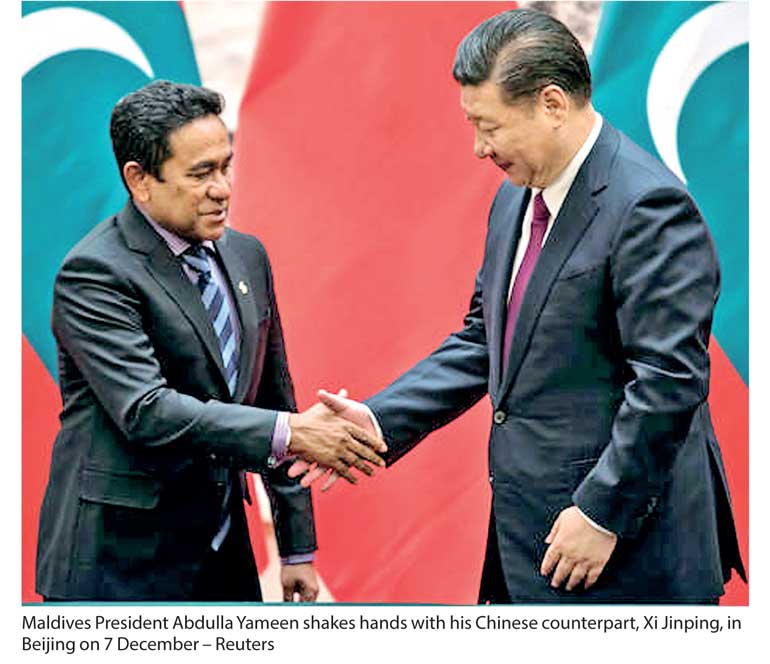Friday Feb 20, 2026
Friday Feb 20, 2026
Wednesday, 20 December 2017 00:00 - - {{hitsCtrl.values.hits}}

By Marwaan Macan-Markar,
Asia regional correspondent
Kathmandu: While India’s political establishment was focused on Nepal’s landmark election on Thursday, China was busy wrapping up a free-trade agreement with the Maldives. The move represents a diplomatic setback for New Delhi, as Beijing expands its influence in South Asia.
Commentary in the Indian media suggests the government was shocked by how the Maldivians cleared the way for the pact on 29 November. The Indian Embassy in Male, the Maldives’ capital, “sent a report on the development, which caught many in Delhi by surprise,” the Indian Express daily noted. Another analyst in “The Quint,” an online publication, was more acerbic, arguing that “India is losing the Maldives plot and China has finally demonstrated the kind of sway it holds on [the South Asian region].”
But the events of 29 November also raised eyebrows in domestic quarters in Male. After all, the FTA was rushed through the Majlis – the 85-member parliament – under the cover of darkness and without the sufficient number of lawmakers, 43, needed for approval.
A parliamentary oversight committee gave the nod to the 1,000-plus pages of the FTA in less than 10 minutes, and the 30 legislators of President Abdulla Yameen’s ruling party, the Progressive Party of Maldives, took less than an hour to sign off on the text. Then, as voters in Nepal were choosing between a pro-India coalition and a left-leaning alliance with Beijing’s blessing, Yameen was in Beijing rubbing shoulders with Chinese President Xi Jinping, finalizing the deal.
In 2014, before the FTA talks began, bilateral trade between China and the Maldives came to an estimated $104 million. The FTA, hammered out over two years, aims to reduce tariffs on more than 95% of goods to zero, with the Maldivians hoping to reap foreign exchange from a spike in fisheries exports to China.
The Maldives, a collection of islands and atolls in the Indian Ocean, earned $140 million from fisheries in 2016, contributing 5% of gross domestic product. That was second to tourism, the money spinner that accounts for 60% of the Maldives’ foreign exchange and contributes to 28% of GDP.
The Maldivian economy, now estimated at $3.6 billion, runs regular trade deficits, given its resource constraints and need to provide for the nearly 400,000 people who live on 200 out of 1,192 islands. Imports last year equaled $2.12 billion, while exports amounted to $137 million.
China currently accounts for the Maldives’ largest import bill -- an estimated $320 million in 2016. But China also contributes to the Maldives’ coffers as the largest supplier of tourists to its luxury resorts.
The Maldives’ own economic progress also prompted the FTA. In 2013, the European Union dropped the island nation from its list of the Least Developed Countries, which are entitled to generous tariff reductions under the EU’s Generalized Scheme of Preferences, or GSP. At the time, 40% of the Maldives’ fisheries exports were headed to Europe.
The Maldives’ per capita income is currently estimated at $11,544 – the highest in South Asia.
“Maldives had to look to China because the European Union had stopped its GSP Plus concessional duty facility to it on account of the country becoming a middle-income country,” Mohamed Shainee, the Maldives’ fisheries and agriculture minister, told reporters during a visit to Sri Lanka after the Majlis approved the FTA.
“Without GSP Plus, Maldivian fisheries products are now paying 25-26% duty to enter Europe.” China’s FTA with the Maldives is its second in South Asia, following the 2006 FTA Beijing concluded with Pakistan. Chinese trade officials have also completed six rounds of talks with Sri Lankan counterparts to nail down a China-Sri Lanka FTA. And Beijing has set its sights on bilateral deals with Nepal and Bangladesh, though so far it is only putting out feelers.
China’s latest inroads into the Maldives expand on a foundation it has laid through loans, grants and Foreign Direct Investment – all aimed at gaining a foothold at a strategic point in the Indian Ocean at India’s expense. The Yameen administration has preferred China over India for its flagship projects – a $400 million expansion of the Maldives’ international airport and the construction of a 1.39km bridge connecting Male to a reclaimed artificial island. Both contracts went to Chinese companies.
Other Chinese State-owned companies have struck deals to build resorts and housing projects.
The Maldivian Democratic Party, the country’s parliamentary opposition, has warned about the political and economic price the country will have to pay for the increasingly authoritarian Yameen’s tilt toward China. Wading deeper into a Chinese “debt trap” will put “additional stress on strategic national assets and [lead to] increasing instability in the Indian Ocean region,” the party said after the FTA was approved.
(Source: /asia.nikkei.com)